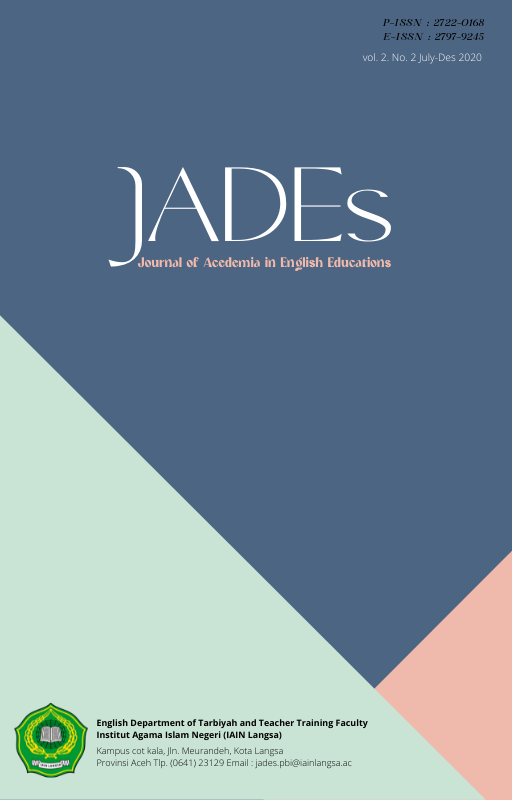Main Article Content
Abstract
This study investigates the use of artificial intelligence (AI) in English as a Foreign Language (EFL) academic writing teaching, with an emphasis on problems and perceptions among Indonesian teachers and students. To analyze prevalent challenges connected to AI use in education, data were collected using a qualitative descriptive approach from teacher comments, classroom observations, and relevant literature. The findings highlight five important themes: low digital literacy, unequal access to infrastructure, student overreliance on AI technologies, a lack of pedagogical training, and varied teacher attitudes towards AI in the classroom. Despite these challenges, many Indonesian EFL teachers recognise AI's potential to assist personalised learning, streamline feedback processes (especially via conferencing), and improve instructional methods. This study advances our understanding of AI's educational impact in Indonesian EFL environments, emphasising the importance of focused professional development and equal access to technology.
Keywords
Article Details

This work is licensed under a Creative Commons Attribution 4.0 International License.
References
- Alghamdy, H. (2023). Ethical considerations in AI usage in education. Journal of Educational Technology, 15(2), 123-135.Ariyanti, A. (2016). The teaching of EFL writing in Indonesia. Dinamika Ilmu: Jurnal Pendidikan, 263-277.
- Baker, R. S., & Inventado, P. S. (2014). Educational data mining and learning analytics. In Handbook of Learning Analytics (pp. 3-15). Society for Learning Analytics Research.
- Binns, R. (2018). Fairness in machine learning: Lessons from political philosophy. In Proceedings of the 2018 Conference on Fairness, Accountability, and Transparency (pp. 149-159).
- Chukharev-Hudilainen, E., & Torrance, M. (2023). The role of AI tools in enhancing EFL learners' writing skills: A case study of Grammarly and Turnitin. International Journal of Language Education, 12(1), 45-60.
- EFL Students' Perceptions in Indonesia and Taiwan on Using AI to Improve Writing Skills. (2024). Jurnal Ilmiah Peuradeun, 12(3), 987-1016. https://doi.org/10.26811/peuradeun.v12i3.1520
- Fortunasari, H. (2016). The digital divide in education: A case study of urban and rural schools in Indonesia. Journal of Educational Research, 9(1), 34-45.
- Grimes, D., et al. (2020). The impact of AI writing tools on academic performance: A systematic review. Journal of Language and Linguistic Studies, 16(2), 123-140.
- Lai, M., & Smith, H. (2021). Cultural resistance to technology adoption in education: A study of EFL teachers' perspectives. Language Learning & Technology, 25(1), 56-72.
- Marzuki, N., et al. (2023). Teacher readiness for integrating AI tools into language education: Challenges and opportunities. International Journal of Educational Technology, 14(2), 78-89.
- Patterns of Utilizing AI–Assisted Tools Among EFL Students. (2024). LLT Journal: A Journal on Language and Language Teaching. Retrieved from https://e-journal.usd.ac.id/index.php/LLT/article/view/7966
- Purnawarman, A., Susilawati, Y., & Sundayana, E. (2016). Exploring the implications of AI in language education: Insights from Indonesian EFL teachers' experiences. Indonesian Journal of Applied Linguistics, 6(2), 123-135.
- The impact of AI writing tools on the content and organization of EFL student writing. (2023). Journal of Language and Linguistic Studies. Retrieved from https://www.tandfonline.com/doi/full/10.1080/2331186X.2023.2236469
- The Use of AI and Technology Tools in Developing Students' English Academic Writing Skills. (2023). Proceedings of the International Conference on Education and Technology. Retrieved from https://jurnalfaktarbiyah.iainkediri.ac.id/index.php/proceedings/article/view/1811
- Tütünüiş, Y., & Küçükali, H. (2014). Personalized learning experiences through technology: Implications for EFL teaching practices in Turkey and beyond. Educational Technology Research and Development, 62(4), 457-474.
- Utilizing Artificial Intelligence-based Paraphrasing Tool in EFL Writing. (n.d.). Retrieved from https://journal.lppmunindra.ac.id/index.php/SCOPE/article/view/14882
- Using Artificial Intelligence (AI) ChatGPT as A Writing Tool. (2024). Journal of Islamic Studies and Humanities. Retrieved from http://jurnal.minartis.com/index.php/jishs/article/view/2060
- Wolf, M., & Brown, J.S. (2023). The transformative potential of AI in education: A review of current trends and future possibilities for learning environments worldwide.Educational Review, 75(1), 1-20.
- Zawacki-Richter, O., Marzouk, S., & Hachem, K.(2019). Systematic review of research on artificial intelligence applications in higher education: Current trends and future directions.International Journal of Educational Technology in Higher Education, 16(39).

